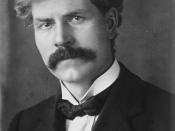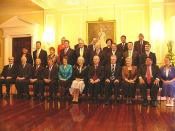To what extent was the 1929 - 31 second Labour Government as successful as circumstances permitted.
After the 'sporting' resignation of Stanley Baldwin, Ramsay Macdonald became prime minister of a minority Labour government for the second time on the 5th June 1929. The second Labour Government took office at a time when unemployment was under 10% and arguably Britain was enjoying a period of relative prosperity. However in 1931 the government's annual pay out in unemployment benefit had increased from ã12 million a year in 1928 to ã125 million by 1931, this at a time when in certain other European countries democratic regimes were being overthrown and replaced by dictatorships. However these events occurred as a result not of the inadequacy of the Labour Government but because of events out of the control of it. The Wall Street Crash brought with it massive world wide economic depression and a situation that neither Labour, the Conservatives nor the Liberals were well equipped enough to deal with.
As had been the case with the previous Labour administration the foreign policies of the second Labour government were a, in the words of Hugh Dalton, 'moderate success story. Both Macdonald and Henderson (the new foreign minister) were able to improve on the successes of the first Labour government; Henderson was to become a dominant figure in the League of Nations (influential in the negotiating of the Young plan) and eventually became the first British statesman to win the confidence of both France and Germany. In conjunction Macdonald was able to successfully negotiate an agreement regarding the respective tonnages of ships therefore disbanding the growing naval rivalry between British and American navies. Once again the Labour government had proven themselves capable enough to successfully deal with foreign affairs.
However domestic policies were to be a completely different story, in the words of Dalton the Labour government's 'record at home' was 'a hard luck story with failure almost unredeemed by either courage or skill.' The only notable successes were the coal miner's act which reduced the standard eight hour shift by thirty minutes and the change in rules which allowed applicants for unemployment benefits to claim their benefit providing that an officer could prove that they had turned down a reasonable offer of work in the first place.
The Wall Street Crash brought with it the 'Great Depression' in October of 1929, the previous unemployment figure was to prove only a mere blip for the events to follow were, to a certain extent, out of the control of any British Government. Due to Britain's heavy reliance upon American loans and American prosperity the already struggling British industries saw their remaining markets disappear. Consequently unemployment levels in Britain (and in the rest of the world) rose drastically and by December 1930 there were around 2 ý million people unemployed.
Macdonald quickly jumped to the defence of his government and blamed the capitalist system, he stated that 'we are not on trial; it is the system under which we live ⦠it has broken down everywhere, as it was bound to break down.' In many respects this statement is true, Labour did not cause the depression but vitally the policies which it employed to deal with the side effects of the stock market crash were hardly the dynamic and ambitious ideas required to tackle such a huge problem. Arguable though, whichever government had had the misfortune to be in power during the economic blizzard would have been hard pushed to survive. Therefore we can, with the benefit of hindsight, look back at the situation and say that in retrospect nothing could have been expected of any administration at such a time of crisis and that whoever might have been in charge was doomed from the minute Wall Street crashed.
In a rather crass attempt to deal with the situation, Macdonald set up a small ministerial team to tackle the ever increasing problem of unemployment. A member of this team was Sir Oswald Mosley. He suggested that there should be more government involvement in order to kick start the economy, introduce protective tariffs, more funding for public works and increased pensions to boost domestic consumption. Macdonald rejected this economic radicalism and when prices continued to get worse he set up a fifteen man 'think tank'. Consequently a period of indecision and drift followed during which the problem of unemployment and the economy gradually got worse. Macdonald was keen to stress that Britain's un-balanced economy was not an isolated incident and that much of the world was in economic freefall. During this period the Labour government was hardly successful but I personally think that under such precarious circumstances no government would have been.
On 19th August 1931 Macdonald and his cabinet sat from 11 in the morning until 10:30 at night discussing the extent of government cuts in expenditure, (a royal commission suggesting that a 30% reduction in unemployment benefit should be imposed). Bearing in mind the fact that Labour was apparently the working man's party it is understandable that the cut in unemployment benefit would be deemed unacceptable. Snowden, bent on balancing the budget, said that there must be a cut of at least 10% in standard benefit. If this did not take place then the international bankers would be unwilling to lend Britain the money that it desperately needed. Another economist, Maynard Keynes, proposed a suspension of the gold standard thus making British exports more competitive.
However having faith in his chancellor Macdonald pushed aside the unorthodox views of Keynes and opted for the cuts in benefit proposed by Snowden. Labour was not just to be a mouthpiece of the trade unions and working men, but it was the leader of a nation and therefore had to act with the best interests of the nation at hand rather than the interests of one group of people. Henderson knowing little about economics insisted that the 10% reduction would be regarded as a betrayal of trust by the loyal Labour supporters. The final vote illustrated a split of 11 - 9 in favour of the cuts and no government could have survived with such a divide and like his predecessor Baldwin MacDonald did the honourable thing and resigned as prime minister.
In conclusion the issue with the second Labour government was not that they failed but that they had no chance of success. Obviously their policy of drift and lack of a clear solution, or at least suggestion to solve the massive problem of unemployment didn't help but any government would have found survival at best difficult. It is worth noting that during this period many democratic governments were overthrown and for this reason the Labour government was successful because it managed to keep violent protests fairly minimal. Personally I would argue that regardless of who was in power, given the circumstance anything that they managed to achieve would be completely overshadowed by the massive problem created by the crash of the stock market and therefore I would argue that although the second Labour government failed in many respects it was in fact as successful as circumstances permitted.





